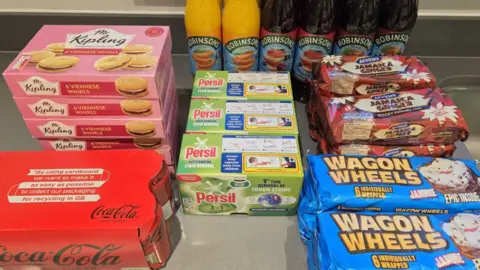A suspected glitch on the evening of May 1, 2025, caused an unforeseen promotional frenzy when several products from the Co-operative Group (Co-op) were listed at drastically reduced prices on the delivery app Deliveroo, including some items priced at an astonishing 100% off. This incident prompted a wave of consumer excitement as users discovered an opportunity to acquire various goods—from jars of Loyd Grossman pasta sauce to Costa ground coffee—entirely free of charge.
Numerous consumers reported success in taking advantage of this glitch, with certain items like Robinsons squash marked down from £1.50 to merely 15p each. However, whether retailers are obliged to honor such discounted prices often hinges on their specific terms and conditions, which can vary quite significantly from one retailer to another. Both Co-op and Deliveroo have been contacted for comment on the incident, though reactions from both have yet to be published.
One shopper, Peter, a resident of Lancashire, was particularly vocal about his experience. He managed to accumulate over £80 worth of goods for a mere £3.29, including delivery fees. Peter expressed his amazement that both Co-op and Deliveroo honored the pricing error, and he expressed intentions to donate most of the items to a local food bank, highlighting the need for non-perishable food items in his community. This generous gesture underscored the far-reaching impact of the glitch beyond simple consumerism.
Adding to the gravity of the situation, it’s worth noting that the Co-op had recently been grappling with the implications of a cyber attack, which had prompted the company to shut down parts of its IT systems due to unauthorized access attempts. However, there is currently no evidence to link the pricing error to this security breach, leaving the situation somewhat enigmatic for both consumers and the retailer.
In another account, a shopper named Robert shared that he received a variety of items ranging from pastries to cereal for only £18, embracing the error in the pricing structure. Meanwhile, Sally Marie from Bolton also capitalized on the glitch after hearing about it through an online platform that labeled the situation a “glitch.” She described her initial skepticism but was delighted to discover numerous items priced at zero. The prompt arrival of her order within 15 minutes only added to the thrill, showcasing how quickly the demand strung from this error took off.
Social media platforms were flooded with testimonials from ecstatic shoppers recounting their low-cost purchases. One user claimed, “Got myself a lot of cheap bits from the Co-op,” alongside comments about how the ultralow pricing on Robinsons squash would be perfect amid the prevailing heat wave. Others revealed substantial discounts on products like Airwick Reed Diffusers, showcasing that the glitch impacted a wide range of items, not just food and beverages.
The Consumer Rights Advisory organization emphasized that consumers’ rights during such promotional errors can be complex, often dictated by the retailer’s terms and conditions. Generally speaking, shoppers should expect no added costs for items sold at a mistakenly lower price if the sale was straightforward without prior discussion over pricing. This added intricacy illustrates the fine line retailers tread when dealing with pricing discrepancies.
These cases hark back to past occurrences, such as the 2022 pricing mistake by Electronic Arts regarding FIFA 23 Ultimate Edition copies sold in India for just 4.80 rupees. That incident saw EA honoring those purchases, which may lend credibility to consumer expectation that retailers will sometimes uphold pricing errors as a matter of principle or customer goodwill.
In essence, the Co-op’s temporary mispricing highlighted the dynamic between retailers and consumers in the modern digital landscape. As the saga unfolded, the convergence of technology, marketing practices, and consumer behavior came together to form a unique case study, raising questions about pricing integrity and the responsibilities of companies engaged in online retailing. It’s a reminder that glitches, while inconvenient for retailers, can sometimes produce unexpected windfalls for consumers willing to seize an opportunity.



